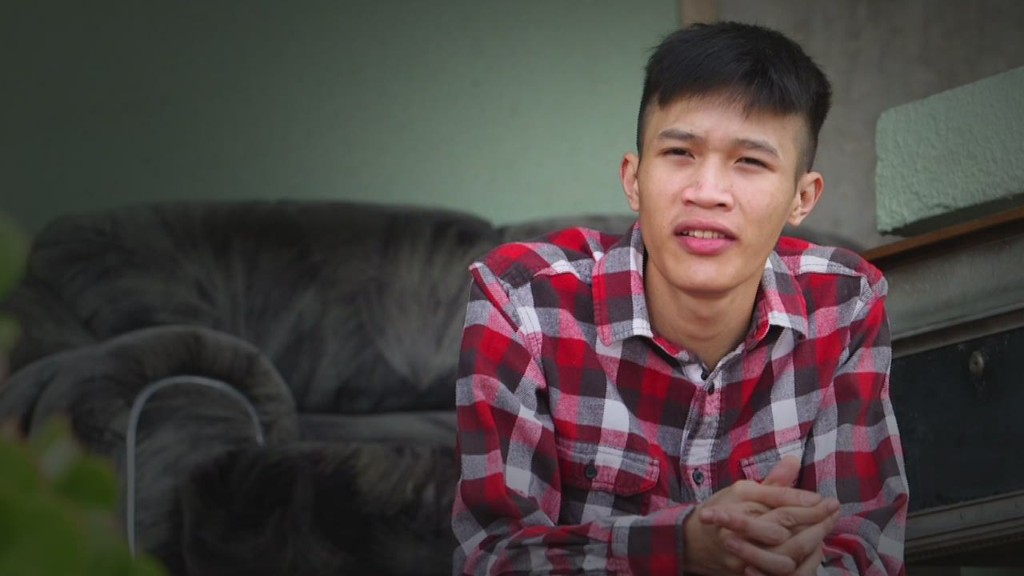
Nhat Ho came to the United States when he was just a year old.
"My parents fought on the side of the United States during the Vietnam War, so they were imprisoned for eight years," Ho said. "I'm a product of two refugees who were prisoners of war that endured a lot of hardships to get me here."
But chasing the American dream wasn't easy.
"I grew up in a pretty bad neighborhood in deep east Oakland," he said. "During that time when we were living there in apartments, my mom was robbed with a gun to her head."
Ho turned to video games as an escape, and he taught himself how to write computer code in sixth grade. The youngest of six children, he watched his siblings struggle with low-paying jobs.
"All my brothers work two jobs, and all my sisters work all day from 9 to 7 at a nail salon," he said. "And I felt like that life isn't for me."
Related: 6 things you need to know about STEM
In high school, Ho was pressured to join a gang. But he used coding as an outlet for staying out of trouble.
"Growing up in East Oakland where there's gangs and drugs, it's hard to remove yourself totally from it," he said. "I didn't gang bang because I knew my parents brought me here for a reason. And that reason was to get an education and be a better person in life."
At 21, Ho is on that path. After taking classes at a community college, he joined Hack the Hood, a small nonprofit that teaches low-income youth ages 15 to 21 how to build websites for small businesses.
"We work with youth of color, folks who have historically been left out of the technological conversation," said Zakiya Harris, Hack the Hood's chief education officer. "What we're doing is allowing them to see how they can utilize technology as a tool and even build it as a career."
"When I first came to Hack the Hood, I was just lost," Ho said. "I didn't know what to do with life. I had the skills to code, but I didn't have an outlet to actually put my work out there."
Related: Ex-con launches startup aimed at inmates
During a six-week program, Ho designed several websites for small businesses, including one for Woody's Cafe and Laundromat, a family-run business that has been in Oakland for 25 years.
"The whole process was very seamless," said Vincent Lau of Woody's Cafe. "All we needed to do was hop on a phone call with Nhat for 5 or 10 minutes, and in about a week or so we had this amazing website."
By helping small businesses gain visibility online, Ho and other participants are building portfolios that could lead to future jobs in tech.
"They're really seeing how this can lend itself to a career without necessarily going to college," Harris said. "These are low-hanging fruit skills in technology that they can actually start using now and earning money."
The program also pairs youth with mentors in the tech industry.
"We get a lot of folks who work in Silicon Valley and who are working in tech to really pay it forward and give back by working with our young people," Harris said.
Since the organization started last summer, it's trained 45 youth to build more than 150 websites for small businesses. And it has already gained the attention of some tech giants.
Related: Why Atlanta is ripe for innovation
In June, Google awarded Hack the Hood a $500,000 grant after it placed in the top four of the Google Impact Challenge—a contest that gave $5 million to non-profits with innovative ideas to make the San Francisco Bay area stronger.
"Over the next two years, our goal is to train over 5,000 young people and build over 10,000 websites for local small businesses," Harris said.
The program has already made an impact on young people like Ho.
He enrolled at UC Davis this fall to study computer science. And he's the first in his family to go to college.
"When I graduate I'm planning on maybe starting a start-up company," he said. "My first real investment is gonna be buying my parents a house. And I feel like that's gonna make them really proud."



